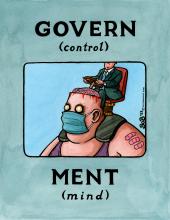2024-03-08
I suspect, I hope, I have faith that political life in this country is growing up.
In many places now we see the stirrings of disillusion, the crumbling of the assumption so assiduously cultivated until now, that having a choice of political parties at elections equates to freedom of choice.
What matters to the man on the Clapham Omnibus is not the colour of the party in power, but whether its policies are to the overall benefit of the people. We see now more clearly than perhaps ever before that on the policies that matter to the WEF, all major parties are at one with the monarchy.
There was a time when Parliament was happy to project the views of the people to the monarch and act as a restraint upon the monarch's power - Charles I took the fall in 17th century to achieve that status quo, yet here we are in the twenty first century with Charles III in close cahoots with the WEF corporate global oligarchs, and a supine Parliament in full lockstep with him. Mysteriously, no major political party sees any future in opposing the WEF - "why not?" is the question that should be on everybody's lips.
It's not as though the WEF's ideas are inconsequential - they are actually provoking outright revolt right the way across Europe. Farming is incomprehensibly being attacked as never before - you would think that at least the French should have known better!
Wars were fought in the 20th Century "for freedom", but increasingly it seems that they were fought only in the name of freedom.
Today we have elections in the name of freedom, but increasingly that freedom is freedom only to choose those ways that are demanded by the WEF.
The election of George Galloway in Rochdale may or may not represent the start of a sea-change in voter attitudes, but in truth it's probably too soon yet to expect major upset to the fortunes of the parties of the WEF at the next general election.
The party system is very deeply embedded, and very deeply controlling by nature. It is hedged about and supported by the Electoral Commission whose job is not and never could be to reform the current system, but to perpetuate it. The party system is also entirely dependent upon incorruptible MPs - sadly history (Cyril Smith et al) shows MPs to be susceptible to corruption.
We need to think outside the box.
Somehow the power over the political parties must be removed from their rich donors (and maybe others) and returned to the people, or the political party system itself must be discarded altogether.
After all, an MP is supposed to represent the constituency, and should therefore simply be fed and watered, hired and fired, by the constituency. What else do we need?
What if the Electoral Commission were to be abolished, and each constituency would set its own rules for sending its representative to Parliament? That would prompt a debate at local level and get everybody involved like never before!
"Chaos!" I hear you cry - yet out of that chaos would come a multitude of different ideas whose results would inform a proper debate for those constituencies that wanted one.
If we the people want a bottom-up system rather than a top-down dictatorship, then we will have to roll up our sleeves and make it happen.



